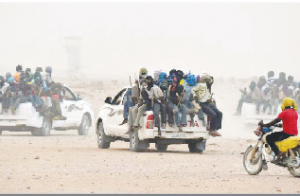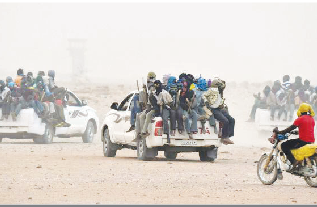Agadez has been a thriving trading hub for 500 years but today the most precious cargo is human. Kevin Sieff reports from a city where desperate souls begin their trek to Europe
The smuggler walked through the back door of the convenience store and into the metal shed where the migrants were hiding. It was a Monday in one of the world’s human-smuggling capitals, the day when trucks crammed with Africans roar off in a weekly convoy bound for Libya, the threshold of Europe.

For Musa, an expert in sneaking people across the Sahara, it was time to get ready. He walked around the white Toyota pickup parked next to the shed, loaded with jugs of water. Then he glanced at the cluster of 30 people waiting to climb atop the load. One of them, an 11-year-old girl from Burkina Faso, sucked a lollipop. A mother held her wailing six-month-old baby. Next to them, 27 men, from five countries, shifted their eyes nervously between Musa and the truck.
If they were not caught or stranded or killed, it would take three days to get to Libya. “We need to leave soon,” Musa said, examining the truck, its windows tinted, its licence plate missing, prayer beads hanging from the rear-view mirror.
Since the 15th century, Agadez has been one of the continent’s most important trading hubs, the gateway between West and North Africa. Now, it is a city run by human smugglers. And, across the developing world, the business of human cargo is thriving.
Musa, 38, knew the risks. He knew that if his truck broke down in the nearly 50C heat, he and the migrants might survive no more than two days. He knew that his pistol was little help against the bandits who roamed the Sahara. But he also knew how to bribe the police and military to let him pass. And he knew the desert as well as anyone. Or he claimed to.
On this Monday, like every other Monday, he and his brothers counted the men and women who had arrived at the stash house tucked behind the grey shopfront advertising soap and baby food. The sun had set. The migrants were covering their faces with scarves. Musa strolled past them in a long white robe, as if preparing for a leisurely drive.
“Before we had migrants, but not like now,” he said. “Now, there are so many that I can’t remember them all. Every week, the trucks are full.”
In Agadez, there are dozens of stash houses, which locals call “ghettos”. They are hidden behind homes, next to mosques and market stalls, part of the city’s secret geography, the architecture of a booming illicit economy.
It is a boom driven by the collapse of the Libyan government, which has left a vast stretch of the North African coast virtually unguarded. Africa’s explosion of mobile phones and social networks has linked smugglers to potential migrants.
“Now, in sub-Saharan Africa, you’re never more than two conversations away from someone who can get you to Europe,” said Tuesday Reitano, a human-trafficking expert at the Global Initiative Against Transnational Organised Crime, a think tank.
Hundreds of men and women from across West and Central Africa pour into the desert outpost every week. The majority are fleeing abject poverty. Others are escaping violence in Mali, north-eastern Nigeria or the Central African Republic. They have only one thing in common: they arrived in Agadez with Musa’s phone number.
Konissa had stepped off the bus in Agadez just after 11 o’clock on a recent Sunday night. He had been travelling for three days from the Ivory Coast. When he walked through the parking lot, men started approaching him, his small black backpack giving him away as a migrant.
“You going to Libya?” they asked in French and Hausa. “You need some help?” But Konissa, 25, already had a contact in Agadez. His uncle had left for Libya last year.
“This man can help you,” the uncle wrote in a text in May, pasting in Musa’s number. A few minutes after getting off the bus, Konissa dialled the number. The parking lot was full of young men sleeping on the ground. On the wall was graffiti in several languages. “Ali from Cameroon was here,” one line read. “A Guinean was here,” said another.
Konissa had spent two years saving for the trip to Europe, eking out a living as a tailor. If he made it to France or Italy, the money he sent back would change the lives of his parents and siblings and their children. “Je suis arriva,” he said to Musa.
Fifteen minutes later, Konissa was driven to the large shed where Musa and his brothers kept the migrants. The ground was strewn with cardboard boxes and old tires. Five wild antelope, captured from the desert, skittered around the adjacent dirt yard.
Before going to sleep, Konissa called his father in a village in the Ivory Coast. “I found the place,” he said.
Western officials portray smugglers as hardened criminals who have driven the surge in migrants to European shores – where more than 100,000 have arrived this year. But in Agadez, smugglers see themselves as businessmen, providing a service that Niger’s desert tribes have mastered.
Musa’s father shuttled goods for years between Agadez and Libya, where US and UN sanctions made legal trade difficult. By the time Musa was 20, he was crossing the Sahara, too. He learned to navigate by ruts in the sand during the day and by the stars at night. When, in 2011, Muammar Gaddafi, Libya’s leader, was overthrown, suddenly no one was stopping boats from leaving the country’s ports for Italy, just 200 miles away. Throngs of migrants began to arrive in Agadez. Musa was ready to profit.
He and his brothers bought a fleet of Toyota pickups stolen from Libya. They built the shed in the store’s backyard and laid down old mats and carpets where the migrants could sleep. They started taking between 25 and 100 migrants across the Sahara every week, charging about £200 each. “My phone number became famous across West Africa,” he said. In three years, Musa was a millionaire. He bought homes in Niger and Libya. He bought cars and camels and smartphones, his selfies reflecting his swagger, a man lying next to a pistol in the desert. He married one woman in Niger and another in Libya. He tried to hide his enterprise from his four children, telling them that he was a trader.
Last month, a delegation from the European Union travelled to Agadez seeking to strengthen Niger’s law-enforcement agencies and stop the smugglers. Police and soldiers, however, are deeply involved in the trade. Many of them earn exponentially more in bribes from smugglers and migrants than they do from their salaries.
Perhaps the most glaring sign of the complicity comes each Monday, when the smugglers and their migrant cargoes leave Agadez in a loose convoy led by a military escort.
“The diplomats come and talk about stopping migration, but it’s just talk,” Mohammed Anacko, president of Agadez’s regional government council, said. “The smuggling networks are strong and the migrants are desperate.”












